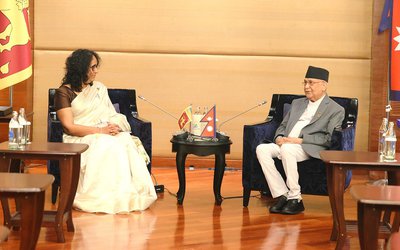The seventh national convention of the Unified Communist Party of Nepal-Maoists (UCPN-M) may have been an occasion for the party to re-dedicate itself to political stability and economic prosperity within a democratic framework. But it ended with an undiluted commitment to totalitarianism.
The convention proposed Chief Justice of Nepal Khil Raj Regmi head the government, replacing the one headed by Baburam Bhattarai. The Maoists seem to aim more at destroying the independent judiciary than "ensuring a fair election under a neutral government". They have always been votaries of judicial accountability to legislature. That Maoists are not ready to give up power became clear when Bhattarai said they must come up with plans to remain in power for at least 20 to 30 years. Bhattarai revealed at the closed-door session that, as prime minister, he was able to protect his cadre and leaders responsible for human rights violations during the conflict. "We all would have been in the Hague... and I stopped that from happening ," he said.
The opposition, mainly the Nepali Congress and the Communist Party of Nepal-Unified Marxist Leninist (CPN-UML), have been protesting, without success, to have Bhattarai replaced by NC president Sushil Koirala as PM. A truly neutral person, acceptable to all, is the CJ. But the proposal has created ripples within the judiciary, with some suspecting a prior understanding between the CJ, the president and the PM.
President Ram Baran Yadav is mysteriously quiet. He has either given in to Maoist pressure or realised he has no constitutional power to confront even a caretaker PM. His visible helplessness, the NC-UML's lack of mass appeal, the judiciary being embroiled in a power-related controversy and the UCPN-M's hold on its cadres as well as the military and police, are all encouraging the former insurgents to not retreat from the totalitarian roadmap. However, the chances of the international community, especially the US and EU, accepting such a regime are almost nil now.
May 28, 2008, the day of the monarchy's removal, has become the reference point. "We will have a desirable political order... only when we adopt a system in which both monarchy and Maoists fit in," says Kamal Thapa, the Rastriya Prajatantra Party-Nepal chief. The growing public anger with the Maoists and other parties may be a pointer to that. Their fear that Maoists first got rid of the king only to target next the judiciary and the army — the real impediments to a totalitarian design — seems to be coming true.
(Courtesy: The Indian Express)

Yubaraj Ghimire
Ghimire is a Kathmandu based journalist.
- Manmohan Singh And The Churn In Nepal
- Jan 08, 2025
- Why ‘Revolutionary’ Communist PM Prachanda Went To Temples In India
- Jun 08, 2023
- Why China Is Happy With Nepal’s New PM
- Jan 03, 2023
- Prachanda Sworn In As PM: New Tie-ups In Nepal, Concern In India
- Dec 27, 2022
- Young TV Anchor As Its Face, RSP Rise Takes Nepal By Surprise
- Nov 23, 2022














